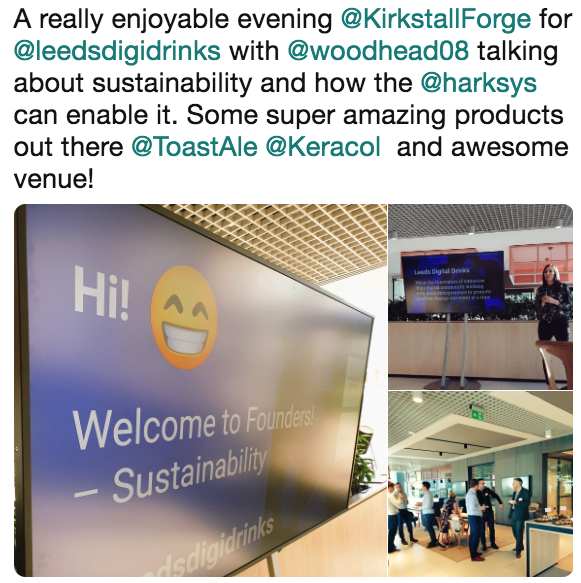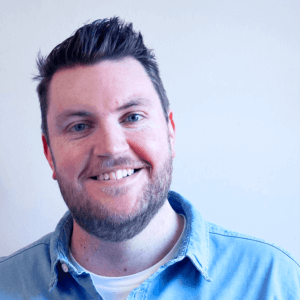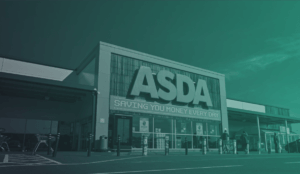Last week we attended Founders – Sustainability, hosted by Leeds Digital Drinks at the lovely Kirkstall Forge. The special event formed part of EU Sustainability Week and was an opportunity for Hark to sit down with other UK entrepreneurs, who are growing businesses with a positive impact on our ecosystem. We were asked to talk around the sustainable benefits of Hark’s IoT technology and some of the challenges we felt we were facing and lessons we’ve learnt so far.

Kirkstall Forge is a beautiful and fascinating place. All the buildings are designed to feature the latest technology and materials to achieve highly efficient energy ratings. The development has been designed to discourage car use, aided by the railway station and onsite car club which will lower the carbon footprint of those living and working there.

Technology used in buildings is something we can relate to! Hark plays the role of enabler in sustainability: The Hark Platform allows organisations to increase efficiency, while reducing waste. We do that by simplifying the route to intelligent assets, or as I like to call it – giving machines a heartbeat. The sustainability value comes from monitoring, storing and analysing sensor data in real time.
The Role of IoT and Sustainability
Hark’s technology can deliver insights for multiple industries. Currently the majority of conversations we have focus on are the Industrial Internet of Things (IIoT) and specifically our expertise in monitoring energy usage in the retail sector.
My exposure to IoT began with Industry 4.0 (a term that has risen in popularity over 5 times in the last 5 years). That term sits under the category of ‘Digital Transformation’ as businesses prioritise digitisation to achieve goals such as ‘overall equipment effectiveness’ ‘reducing downtime’ or ‘optimise maintenance costs’.

There are almost endless ways that IoT deployments can increase social value. 84% of IoT deployments are currently addressing, or have the potential to address Sustainable Development Goals (SDGs) according to the World Economic Forum. The challenge is finding a way to compare the impact of IoT projects on a like-for-like basis on those Sustainable Development Goals to truly measure social value.
I find it easiest to think about the positive outcomes that our technology can create in everyday work scenarios, for example:
Imagine you work in a supermarket and you receive an alert that one of the storage refrigerators is failing to keep the contents adequately chilled – there could be a number of reasons for this: a leak, perhaps a faulty seal or an issue with the compressor. All of which require maintenance and without detection could mean food wastage and excess energy consumption. Our tech raises awareness earlier.
Now, scale that problem across a number of refrigerators, hundreds of locations and that becomes a powerful discovery. The benefits of that discovery extend beyond business operations and cost saving to broader society in the reduction of greenhouse gas emissions.
Our Challenges in Realising Sustainability
We were asked to prepare and talk about challenges we’re facing in our IoT journey so far. These can be categorised into 3 areas:
-Staying on vision
-Selling
-Team
Staying on Vision
With so many uses for technology, staying on vision can be difficult. Try to run decisions through the filter of the company vision. For us that’s been asking the question “will this project, this client, this scenario help remedy real world challenges: reducing waste, improve efficiency, increase yield?”
We’re tech enthusiasts and so there can be the temptation to just build something cool, but we try to think about the positive outcome that would be created and a way to measure the success of our software solution, whilst also balancing that the software is only part of the solution to changing behaviours.
Selling
With any business the goal is for growth, but that growth has to be sustainable.
One of the challenges we’ve perhaps underestimated is businesses selling to us, which may not have immediately obvious benefits, and in some cases may not have any. Investment conversations are plentiful, which we’re extremely grateful for, however just because we may qualify for a funded project doesn’t necessarily mean we should take it.
The flip side of this is that we have made some excellent partnerships which have really helped drive us forward and been mutually beneficial. These partnerships relate both to the technology but also to the end outcome – again reflected in the WEF’s guidelines for IoT which has 3 areas: collaboration models, business models and impact measurement. We’ve found that we are selling the connectivity (collaboration) but also the end use (impact) which often means selling to different stakeholders.
Team
Our final learning is around the team. Hark has a great team, who spur each other on to do great things. As with most businesses there is a difference between working in and working on the business. In that sense we feel we have a responsibility for sustainable careers for our team. Really, here, I’m referencing workplace wellbeing and looking inwardly. We wear many hats, but it’s useful to ask the question – am I the only person who can do this? If not, then give permission and empower people to create and manage those items.
Giving permission can also be reflected when looking outwardly. Our technology by nature is transforming the operations of our clients and customers. Teams that were siloed are now working as one because both stakeholders have visibility of data – e.g IT teams and property teams.
We were happy to play a small part in raising awareness of sustainable projects in and around the Leeds area and across Europe and in the words of Ben from Toast Ale – To change the world we have to throw a better party than those destroying it.
Let us know what you thought of the event on @harksys Twitter.



